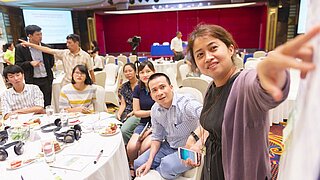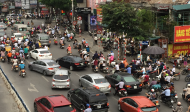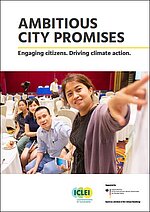Be the change

How Southeast Asian cities with IKI support are reimagining citizen-driven climate action.
There is no simple solution to the climate emergency. Climate action is an iterative process of communication, collaboration, self-evaluation, learning, and open-minded exploration that moves closer to local solutions. Driving this action requires consistent effort, and cities cannot afford to be complacent in ensuring a sustainable future.
The Ambitious City Promises (ACP) project, funded by the International Climate Initiative (IKI), made the case that citizens, local stakeholders and public authorities should collectively drive local climate planning and implementation. ACP’s name describes the outcome ambitious climate action plans as collaborative City Promises, with inspiration from Seoul Metropolitan Government’s ‘Promise of Seoul’.
For four and a half years, ICLEI disseminated Seoul’s approach to Southeast Asia, supporting project cities in Indonesia, the Philippines, and Vietnam through co-creating visions of inclusivity and bold action with their citizens. The theory of change focused on three key pillars: empowering citizens, facilitating city-to-city exchange, and making inclusive climate promises. Through the project, Jakarta, Pasig City, and Hanoi each produced a City Promise, with demonstration projects, stakeholder pledge platforms, and stories of bottom-up engagement as proofs of concept along the way. Read the full report to learn more about their respective journeys.
The need for ambitious climate action in Southeast Asia
Cities across Southeast Asia are not only experiencing the challenges of rapid urbanization but are also particularly vulnerable to the threats of climate change. In the face of these parallel challenges, citizen engagement and empowerment become even more critical in order to co-create climate action that will curb emissions while promoting sustainable communities.
Each of ACP’s member cities has its own story and motivation for joining the project. Many are located in low-lying areas susceptible to sea-level rise. Some cities are keen to reimagine waste management approaches, while others are focused on curbing air pollution. In the end, all are striving towards a sustainable future by increasing the pace of climate action and contributing to related national and global goals.

Indonesia: Jakarta, Bekasi, Tangerang
Jabodetabek, the largest metropolitan region in Southeast Asia and the world’s second most populous, features the Indonesian capital of DKI Jakarta and two satellite city partners, Bekasi and Tangerang. Home to 31 million people – and counting – Jakarta is simultaneously sinking, growing, and increasingly vulnerable to flood risk, while generating enough waste to stretch the region’s landfill in Bekasi to capacity. Increased manufacturing activity in Tangerang and economic growth across Indonesia leaves Jabodetabek delicately balancing incentives in its push to co-create a low emissions development pathway. In the face of these challenges, Jakarta is focusing on reaching residents in meaningful ways to raise awareness about the climate crisis and informing citizens what they can do to protect the environment. Read more about how Jakarta’s religious leaders united to engage their congregations in climate action.
Philippines: Pasig, Marikina, Parañaque
These three cities in Metro Manila often cooperate as part of the 16-city National Capital Region. Metro Manila is as dense as Mumbai and as susceptible to tropical storms as New Orleans, yet has a relatively modest emissions profile. The Philippines sees mitigation as a path to adaptation, and Pasig City has led local governments looking to welcome new stakeholder engagement approaches. Marikina (a manufacturing hub) and Parañaque are particularly striving to incorporate innovative waste management and urban greening practices.
For Pasig City, business as usual is no longer an option. Read more about the bold goals set out in the Promise of Pasig.
Viet Nam: Hanoi, Soc Son, Son Tay
Viet Nam’s capital of Hanoi exemplifies the challenge of balancing rapid urbanization and low emissions development. Air pollution is a top priority in a city with nearly as many motorcycles as people, plus traditional methods of cooking and crop disposal that eject ash into the air. The Hanoi People’s Committee joined ACP in revisiting its preexisting action frameworks, with the aim to co-create emissions reduction methods and strategies to implement across the sprawling capital. Unlike institutional arrangements in ACP’s Southeast Asian peers, the city of Hanoi encompasses the rural Soc Son and Son Tay Districts, having annexed both in a 2008 expansion of Hanoi’s boundaries.
Read how Hanoi is planning to reach its goal of quadrupling green space through co-designing public spaces with local communities.
A new theory of change, promises, and empowerment
Both the process of formulating locally-specific climate action policy and the theory of engagement differentiate this project. Peer exchange was inherent to the project design and therefore ACP was able to spread the Seoul Metropolitan Government’s climate action strategy ‒ a co-created ‘City Promise’ ‒ to Southeast Asia. The Seoul Metropolitan Government (SMG) created the ‘City Promise’ climate action strategy in 2015 to actualize Paris Agreement objectives for local governments. Seoul has been able to outpace South Korea’s national emissions reduction targets, and is leading its national peers in their quest to achieve climate neutrality by 2050.
ACP sought to transfer the idea of a ‘Promise’ that connotes a different relationship to goal-setting. The project wagered that if stakeholder engagement was the process to design City Promises (versus an afterthought), then climate action pledges would better reflect citizens’ daily realities, motivations, and capabilities, and engender a newfound sense of collective accountability. This method is by no means a silver bullet, but it empowers and motivates stakeholders to spread visions of climate action in their local communities.
The project recognized how education and behavioral change could spark knowledge sharing from unconventional sources. Project city governments learned from their citizens, national and international peers, and most importantly each other, through a series of collaborative engagement activities. Whether it was expert meetings with SMG, joint meetings among model cities, a European study tour, visits to national peers, or rounds of public consultations, each city had the opportunity to learn from and contribute to its fellow project members. By continually opening the door to their own communities, local peer governments, and global thought leaders, city governments were able to co-create and triangulate solutions most applicable to their contexts.
What’s next?
Southeast Asian cities are set to continue their rapid expansion that necessitates an integrated, stakeholder-driven, and proactive urban management approach.
At the ACP Final Workshop, held on June 25, 2021, project cities and supporting partners gathered to celebrate the project outcomes. The workshop was opened by Dr. Vera Rodenhoff, representing the Federal Ministry for the Environment, Nature Conservation and Nuclear Safety (BMU). In her opening remarks, she stressed that cooperation both among cities and with national ministries is crucial to climate action. Rodenhoff highlighted strong support from local political partners and the long, successful cooperation between BMU and its partners in Indonesia, Philippines and Viet Nam.
ICLEI Secretary General, Gino Van Begin, shared his vision as part of the ceremonial handover of each city’s Promise. “I believe that our cities are well equipped to meet their commitments and are set to make strong contributions in the global push towards climate neutrality. It is our hope that the cities that are with us today will embolden fellow local and regional governments across Southeast Asia, as well as globally,” he said.
Although the ACP project has officially ended, the strong commitment from all partners assures that ambitious climate action will continue to be high on the agenda of local and national governments in Southeast Asia.
This article was originally published on the "City Talk: A Blog by ICLEI"
The link has been copied to the clipboard
Contact
IKI Office
Zukunft – Umwelt – Gesellschaft (ZUG) gGmbH
Stresemannstraße 69-71
10963 Berlin





![[Translate to English:] Die Petronas-Türme im Stadtbild Kuala Lumpurs; Foto: Unsplash/Ishan](/legacy/_processed_/f/8/csm_180215_ishan-seefromthesky_Header310_661e6fc5b9.jpg)